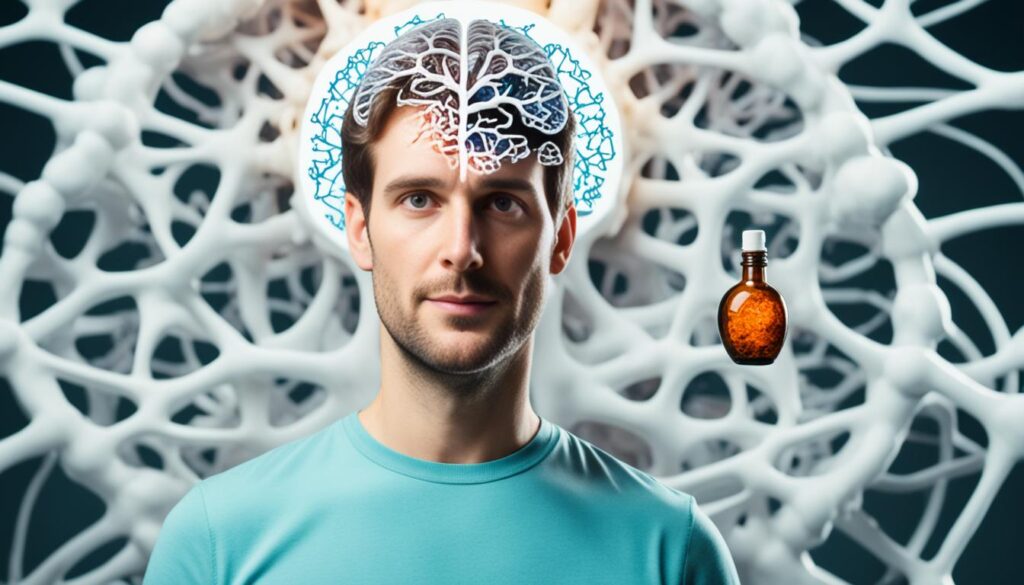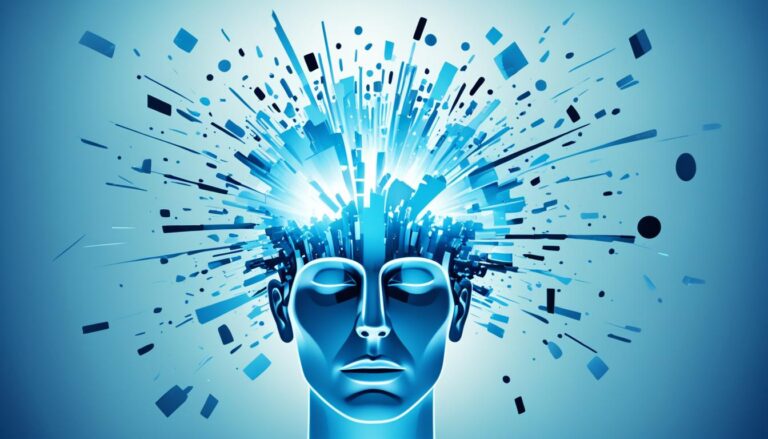Lithium has been a key treatment for mood disorders, especially bipolar disorder, since the mid-1800s. It has been studied a lot and used in treatment plans. Now, studies show it might also help with unipolar depression when other treatments don’t work well.
Every year, 16 million Americans deal with depression. The first study on using lithium for depression was in 1968. It found that adding lithium helped patients who didn’t get better with antidepressants. This is important because 30-50% of people with Major Depression don’t find relief with one treatment.
Lithium has also been shown to lower the risk of suicide in depressed patients. This makes it a hopeful treatment for severe depression. We will look into whether lithium is effective for depression, its safety, and its place in treating depressive disorders.
Key Takeaways
- Lithium is primarily used as an adjunctive treatment for unipolar depression.
- The first trial evaluating lithium for unipolar depression occurred in 1968.
- Over 16 million Americans are affected by depression annually.
- Remission rates are notably improved with lithium when other treatments fail.
- Lithium is known for its potential in reducing suicidal ideation in patients.
Understanding Lithium as a Mood Stabilizer
Lithium is a strong mood stabilizer. It’s key in managing mood disorders. It helps treat bipolar disorder and can also be used for unipolar depression when other treatments don’t work. About 70-80% of people with bipolar disorder control their condition with lithium.
Lithium works by affecting the central nervous system. It helps with mood, thinking, and behavior. It can take weeks to fully work, but it’s important for managing depression. Lithium also has special effects that help prevent suicide, making it different from other treatments.
Even though lithium has been used for a long time, many people don’t use it. This is because some side effects can be a concern. But, most side effects are mild and may go away as the body gets used to the medication. It’s important to check lithium levels often to make sure it’s working right and to keep patients safe.
Lithium works well for treating mania and helps keep mood stable over time. It’s also used for depression, even though it’s not as widely used for that. Its benefits make it a good choice for many people.
| Effectiveness of Lithium | Details |
|---|---|
| Successful Management | 70-80% of individuals manage bipolar disorder with lithium alone |
| Side Effects | 75% of users experience side effects, often mild and decreasing over time |
| Time to Effectiveness | May take several weeks for mood stabilization |
| Unique Properties | Provides anti-suicidal benefits not found in other treatments |
| Monitoring Requirements | Regular blood tests vital for kidney and thyroid function |
What is Lithium?
Lithium is a naturally occurring element that has become important in psychiatry for treating mood disorders. The lithium carbonate definition talks about its most common form given by mouth. This mineral has a long history, but its use in medicine started in 1949 for bipolar disorder.
Now, lithium is being studied for more than just bipolar disorder. Research shows it can help people with major depression who don’t respond to usual treatments. This could make lithium a key part of treatment for depression.
People taking lithium are less likely to be hospitalized again and try to commit suicide. A study in Finland looked at over 123,000 patients with unipolar depression. It found that 40% were hospitalized again over 8 years. But, those on lithium were much less likely to be readmitted.
For over 60 years, lithium has been used to help manage mood, especially in bipolar disorder. Studies show it can make treatment more effective for major depression. In one study, 40% of patients got better with lithium, while only 14.4% did with a placebo.
Research into lithium for major depression is ongoing. It works by changing levels of neurotransmitters like serotonin and dopamine, which helps with mood. This makes lithium a key part of treating mental health in psychiatry.
| Study | Findings |
|---|---|
| Finnish Population Study | 40% of patients hospitalized for severe unipolar depression were re-hospitalized |
| 8-Year Follow-Up Study | Patients taking lithium were half as likely to be re-hospitalized |
| Sweden Study | 14% decrease in suicide attempts during lithium treatment compared to valproate |
| Randomized Mood Disorder Study | 40% of patients on lithium were less likely to die by suicide |
| Major Depression Augmentation Study | Almost 3 times higher likelihood of positive response with lithium vs. placebo |
Role of Lithium in Treating Bipolar Disorder
Lithium is key in managing bipolar disorder, acting as a mood stabilizer. It’s especially good for classic, nonmixed mania. It helps reduce the number and severity of mood swings.
Studies show lithium also helps with bipolar depression over the long term. It’s not the best treatment for sudden depression, but it helps prevent future mood swings. When used with certain drugs, lithium can make antidepressants work better, especially for those with high anxiety.
One drug, quetiapine, works well with lithium to ease anxiety. Research shows long-term lithium use can lower the risk of suicide in people with bipolar disorder. This makes lithium a vital part of treatment plans.
Lithium also changes the brain in positive ways. It makes the hippocampus bigger and increases grey matter in the cortex. These changes help with mood control, making lithium a key treatment for bipolar disorder.
Using a mix of treatments makes lithium more effective for bipolar depression. If you’re thinking about herbal supplements, talk to a doctor first. Research on supplements like St. John’s Wort shows they can affect mood and anxiety. This ensures you’re using them safely and effectively.
Is Lithium Effective for Depression?
Depression affects about 16 million American adults every year. This shows how important it is to find good treatments. Lithium is being looked at as a possible help for those who don’t get better with usual treatments. This part talks about the proof that shows lithium works well, and what happens when people use it for a long time.
Clinical Evidence Supporting Lithium’s Efficacy
Studies show that lithium works best when added to other treatments. A big study with over 30,000 people found that almost two-thirds felt much better. It’s seen as a key option for those who don’t get better with usual treatments.
When people took more than 600mg of lithium a day for a week, they got even better results with their usual antidepressants.
Long-term Lithium Use and Its Effects on Depression
Lithium has shown to be effective over time. It helps keep mood stable and prevents severe depression that might need hospital care. It also lowers the chance of suicidal thoughts in people with mood issues.
Some side effects like shaking, more thirst, and gaining weight are possible. But for many, the benefits are worth it. Keeping the right lithium levels is key for long-term success in treating depression.

Mechanism of Action: How Lithium Works in the Brain
Lithium does more than just help with mood. It gets involved in complex processes in the brain. It works with neurotransmitters and brain parts that help control mood. Researchers are still learning how lithium helps people with mood issues.
Impact on Neurotransmitter Levels
Lithium changes how neurotransmitters work, especially serotonin. By making more serotonin available, it helps reduce depression and keep mood stable. This shows lithium is a key part of treating depression and other mood disorders.
Influence on Mood Stabilization
Lithium also affects mood by working with brain areas that control emotions. Studies show it can make the brain healthier, leading to better mood and less impulsiveness. These changes help lithium work well over time in treating depression and preventing mood swings.
| Effect of Lithium on Brain Structure | Changes Observed |
|---|---|
| Gray Matter Fraction | Increased |
| Cortical Thickness | Increased in Frontal and Parietal Cortices |
| Volume Changes | Putamen, Hippocampus, Thalamic Nuclei |
| Gene Expression | Changes in Peripheral Blood Lymphocytes |
Lithium Treatment for Depression: Dosage and Administration
Lithium treatment for depression has specific guidelines for dosing. It’s important for patients and doctors to know the right dosage and how to use it safely.
Typical Dosing Guidelines
For depression, the usual daily lithium dose is 600 mg to 1200 mg. Treatment often starts with a lower dose, like 300 mg at night. Then, the dose increases by 300 mg each week, based on how the patient responds.
By the end, doses usually settle between 900 mg and 1200 mg. These amounts can change based on the patient’s age and other medications they take.
For kids aged 7 to 12, weighing 20 to 30 kg, the starting dose for mania can be 600 mg. It can go up to 1500 mg a day, depending on what the doctor thinks is best. Adults might take lithium 2 to 3 times a day, depending on their needs.
Monitoring Lithium Levels for Safety
Checking blood tests regularly is key when taking lithium for a long time. This helps avoid too much lithium, which can cause serious side effects like severe nausea, shaking hands, and confusion. The goal is to keep lithium levels between 0.6 to 0.8 during maintenance. During acute episodes, levels might go up to 0.8 to 1.2.
It’s important to store lithium safely, keeping it at room temperature and away from sunlight. Make sure it’s not within reach of kids. Don’t stop taking lithium suddenly, as it can lead to more symptoms. For more mental health tips, check out this resource.
| Patient Group | Initial Dosage | Maintenance Dosage |
|---|---|---|
| Adults | 300 mg at night | 600 mg to 1200 mg daily |
| Children (7-12 years) | 600 mg to 1500 mg daily | Based on clinical judgement |
| Older Adults | Starting around 300 mg | Reduced by 20% to 30% |
Benefits of Lithium Augmentation Therapy
Lithium therapy can help people with major depression who haven’t gotten better with standard treatments. It can be a new way to improve mental health. Studies show lithium helps, especially for those with treatment-resistant depression.
When to Consider Augmenting Antidepressants with Lithium
Doctors might suggest adding lithium to antidepressants in certain situations:
- When patients show limited response to initial antidepressants.
- If there is a history of severe depressive episodes.
- When previous treatments have failed and psychiatric symptoms persist.
About 30-50% of people with major depression don’t get better with one medication. Lithium can be a helpful addition in these cases. It’s especially useful for severe depression.
Rapid Response in Patients with Severe Depression
Adding lithium to antidepressants can lead to quick mood improvements. In one study, 8 out of 29 patients saw a big change in just 48 hours. This shows lithium can be a key part of treatment for those in crisis.
This method has been successful for over 25 years. With careful monitoring and adjusting the dosage, patients can see great results. They also need ongoing care for their mental health.
| Study | Findings |
|---|---|
| Sugawara et al. (2010) | Identified predictors of efficacy in lithium augmentation. |
| McKnight et al. (2012) | Provided insights into lithium’s toxicity profile. |
| Cipriani et al. (2009) | Compared the efficacy of multiple antidepressants. |
| Bauer et al. (2014) | Explored the role of lithium augmentation in major depressive disorder. |
| Nierenberg et al. (2006) | Compared efficacy of lithium versus T(3) augmentation. |
Side Effects and Risks of Lithium Use
Lithium is often used to help manage mood. But, it has its own set of side effects and risks. It’s important for patients to know about these issues, especially when taking it for a long time for depression. Knowing about them helps in keeping treatment safe.
Common Side Effects
Many people feel side effects when they first start taking lithium. These can include:
- Frequent urination
- Weight gain
- Nausea and gastrointestinal discomfort
- Tremors
- Fatigue
These symptoms can make everyday life harder. But, they can often be managed. Talking to a healthcare provider can help adjust the dosage or find other treatments.
Long-term Side Effects and Toxicity Risks
Using lithium for a long time can lead to more serious side effects. These include:
- Hypothyroidism
- Chronic kidney disease
- Hyperparathyroidism and related calcium balance issues
- Potential cardiovascular effects such as sinoatrial node dysfunction
- Neurological conditions, including encephalopathy
People with kidney or heart problems may be at a higher risk. It’s crucial to keep an eye on kidney function and thyroid levels. Also, mixing lithium with other drugs can make these risks worse. This shows why seeing a doctor regularly is key.

Lithium vs. Other Treatment Options
Looking at lithium efficacy for depressive disorders, it’s key to see how it stacks up against other treatments. Studies show lithium is a strong addition to treating depression. There are many other treatments out there, but they work differently for everyone.
Comparisons with Alternative Augmentation Agents
Research in 71 studies with over 30,000 people shows lithium’s power. Standard antidepressants help 28 to 47 percent of people feel better. But, adding lithium to treatment helps about two-thirds of people feel much better. More than half of people got better when lithium was part of their treatment plan.
| Treatment Method | Remission Rate | Clinical Improvement Rate |
|---|---|---|
| Antidepressant Monotherapy | 28-47% | N/A |
| Lithium Augmentation | Over 50% | ~66% |
Considering Transcranial Magnetic Stimulation (TMS)
Transcranial Magnetic Stimulation (TMS) is another option for treating treatment-resistant depression. It’s non-invasive and might help those who don’t get better with lithium or antidepressants. Choosing the right treatment means getting a plan that fits you best, helping you recover better.
Lithium’s Role in Depression Management
Lithium has become a key player in managing depression, especially for those with bipolar disorder. Research shows it helps with mood and lowers suicide risk. A study found lithium helped prevent suicide attempts in veterans with depression or bipolar disorder.

A study and analysis confirmed lithium’s importance in preventing mood swings in bipolar disorder. Recent studies highlight its brain-protective effects. This shows lithium is crucial for managing mood disorders.
Lithium also helps after electroconvulsive therapy (ECT), a review found. It may stop depression from coming back. For those with bipolar disorder, lithium improves mood when combined with better sleep habits. This makes lithium a key part of treating mental health.
But, doctors must watch for side effects of long-term lithium use. Kidney problems are a concern, so monitoring is key. Research on lithium’s benefits and risks is ongoing, showing its importance in treating depression.
For better health, taking in nutrients like folic acid is important. Learn more about folic acid’s role in health at https://bodybalancetips.com/folic-acid-a-comprehensive-breakdown/.
Long-term Lithium Use for Depression: What You Should Know
Using lithium for a long time can really help with depression. It keeps symptoms away and helps people feel better and more stable. It’s important to talk often with your doctor while taking this treatment.
When taking lithium for a long time, you’ll need regular checks on your kidneys and thyroid. This is because lithium can affect these organs. Doctors say mood stabilizers like lithium might take a few weeks to work fully. So, be patient and keep an eye on how you feel.
Long-term use of lithium might cause some side effects. These can include feeling thirsty, gaining weight, or even shaking. Talking to your doctor about these side effects is important. They can adjust your lithium dose if needed.
Using lithium together with therapy and counseling can make treatment work better. This helps with mental health by looking at different parts of your life. Starting long-term lithium use is a big step, but it can really help when done right.
Keeping magnesium levels balanced is key for feeling good and staying stable on lithium.
Conclusion
This article looked at lithium’s role in treating depression, especially for those who don’t respond well to usual treatments. Studies show that adding lithium might make antidepressants work better. However, the results are not clear-cut, and there’s no big difference between lithium and other medications.
Even with few studies, there’s strong evidence that lithium could help. It’s also cheaper than some other treatments. So, it could be a good choice for some people.
When asking if lithium works for depression, we must look at both its good points and possible downsides. Over the years, many people with bipolar disorder haven’t gotten the first recommended treatment. Yet, lithium is still an important option for many. It’s key to understand its role in treating depression for those who need it.
People with depression should talk to their doctors about all treatment options. Discussing lithium therapy as part of a full treatment plan can be very helpful. It could lead to better outcomes and improve life quality.


